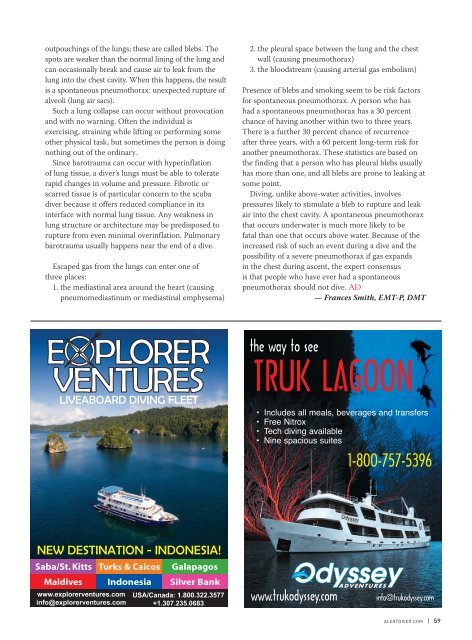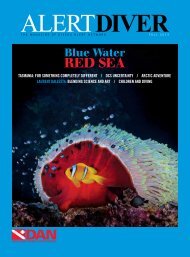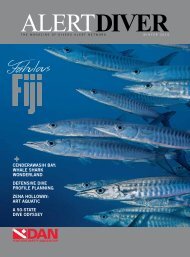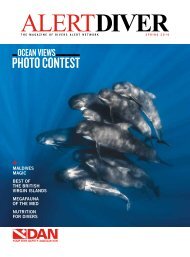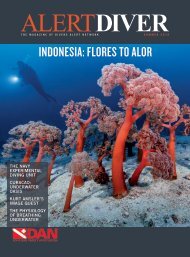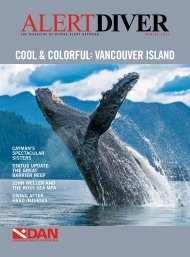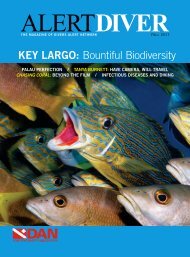AD 2018 Q1
Alert Diver is the dive industry’s leading publication. Featuring DAN’s core content of dive safety, research, education and medical information, each issue is a must-read reference, archived and shared by passionate scuba enthusiasts. In addition, Alert Diver showcases fascinating dive destinations and marine environmental topics through images from the world’s greatest underwater photographers and stories from the most experienced and eloquent dive journalists in the business.
Alert Diver is the dive industry’s leading publication. Featuring DAN’s core content of dive safety, research, education and medical information, each issue is a must-read reference, archived and shared by passionate scuba enthusiasts. In addition, Alert Diver showcases fascinating dive destinations and marine environmental topics through images from the world’s greatest underwater photographers and stories from the most experienced and eloquent dive journalists in the business.
Create successful ePaper yourself
Turn your PDF publications into a flip-book with our unique Google optimized e-Paper software.
outpouchings of the lungs; these are called blebs. The<br />
spots are weaker than the normal lining of the lung and<br />
can occasionally break and cause air to leak from the<br />
lung into the chest cavity. When this happens, the result<br />
is a spontaneous pneumothorax: unexpected rupture of<br />
alveoli (lung air sacs).<br />
Such a lung collapse can occur without provocation<br />
and with no warning. Often the individual is<br />
exercising, straining while lifting or performing some<br />
other physical task, but sometimes the person is doing<br />
nothing out of the ordinary.<br />
Since barotrauma can occur with hyperinflation<br />
of lung tissue, a diver’s lungs must be able to tolerate<br />
rapid changes in volume and pressure. Fibrotic or<br />
scarred tissue is of particular concern to the scuba<br />
diver because it offers reduced compliance in its<br />
interface with normal lung tissue. Any weakness in<br />
lung structure or architecture may be predisposed to<br />
rupture from even minimal overinflation. Pulmonary<br />
barotrauma usually happens near the end of a dive.<br />
Escaped gas from the lungs can enter one of<br />
three places:<br />
1. the mediastinal area around the heart (causing<br />
pneumomediastinum or mediastinal emphysema)<br />
2. the pleural space between the lung and the chest<br />
wall (causing pneumothorax)<br />
3. the bloodstream (causing arterial gas embolism)<br />
Presence of blebs and smoking seem to be risk factors<br />
for spontaneous pneumothorax. A person who has<br />
had a spontaneous pneumothorax has a 30 percent<br />
chance of having another within two to three years.<br />
There is a further 30 percent chance of recurrence<br />
after three years, with a 60 percent long-term risk for<br />
another pneumothorax. These statistics are based on<br />
the finding that a person who has pleural blebs usually<br />
has more than one, and all blebs are prone to leaking at<br />
some point.<br />
Diving, unlike above-water activities, involves<br />
pressures likely to stimulate a bleb to rupture and leak<br />
air into the chest cavity. A spontaneous pneumothorax<br />
that occurs underwater is much more likely to be<br />
fatal than one that occurs above water. Because of the<br />
increased risk of such an event during a dive and the<br />
possibility of a severe pneumothorax if gas expands<br />
in the chest during ascent, the expert consensus<br />
is that people who have ever had a spontaneous<br />
pneumothorax should not dive. <strong>AD</strong><br />
— Frances Smith, EMT-P, DMT<br />
N<br />
LIVEABOARD DIVING FLEET<br />
• Includes all meals, beverages and transfers<br />
• Free Nitrox<br />
• Tech diving available<br />
• Nine spacious suites<br />
NEW DESTINATION - INDONESIA!<br />
Saba/St. Kitts<br />
Maldives<br />
www.explorerventures.com<br />
info@explorerventures.com<br />
Turks & Caicos<br />
Indonesia<br />
Galapagos<br />
Silver Bank<br />
USA/Canada: 1.800.322.3577<br />
+1.307.235.0683<br />
ALERTDIVER.COM | 59


